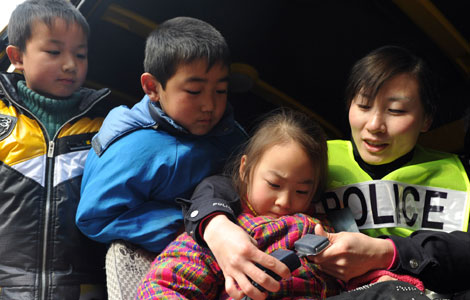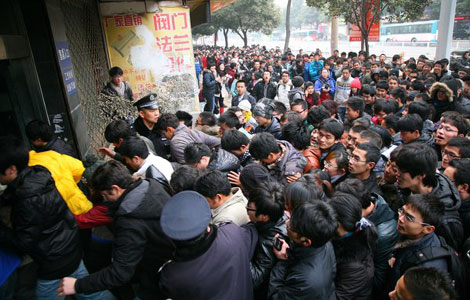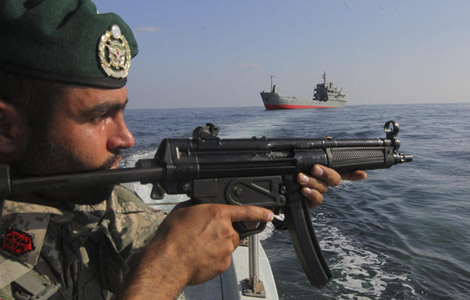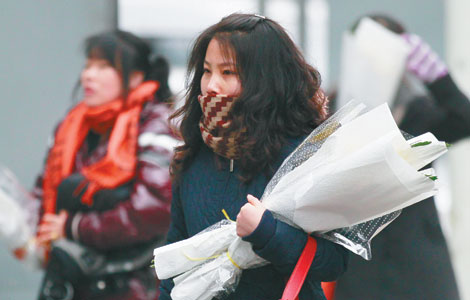Grief-stricken people bid final farewell
Updated: 2011-12-29 07:41
By Wu Jiao and Zhao Shengnan (China Daily)
|
|||||||||||
 |
|
People surround a hearse carrying the coffin of Kim Jong-il during his funeral procession in Pyongyang December 28, 2011. [Photo/Agencies] |
According to Yu Yingli, a scholar at the Shanghai Institute for International Studies, the power transition within the DPRK, with repeated support for Kim Jong-un, was smooth.
"Young Kim has built up his role as leader of the country," Yu said.
Kim, believed to be in his late 20s, remained unknown until being promoted to high-ranking military and party posts in 2008 when his father reportedly suffered a stroke.
Yu said that despite thorny issues in the DPRK's ties with some countries, notably the United States, the Republic of Korea (ROK) and Japan, maintaining stability on the Korean Peninsula is the shared goal of these countries. This should translate into less pressure from foreign affairs and allow Kim to focus on domestic issues for the time being, Yu said.
The ROK military on Wednesday lowered the level of its cyber warfare readiness system to normal, about a week after raising it a notch in the aftermath of Kim's death.
According to Wang Junsheng, an expert on Asian studies at the Chinese Academy of Social Sciences, the new administration may hasten economic reforms.
Kim's death came as the government was seeking to attract more foreign investment from China, Europe, Southeast Asia and the Middle East.
Pyongyang has moved toward expanding the economy in recent years.
One sign of a shift in economic policy came in 2008 with a surprising decision to allow 3G cell phones in a deal with Egyptian telecom company Orascom, which claims to have 809,000 subscribers in the DPRK, Bloomberg reported.
"Kim Jong-un will take the path shaped by his father and continue economic reforms," Wang said.
The late Kim visited China's economic hubs to observe the development process.
"The young leader may try some economic reforms such as a partial market system and foreign investment zones," Cho Bong-hyun, a researcher at the IBK Economic Research Institute in Seoul, who has visited the DPRK more than 30 times since 2000, was quoted by Bloomberg as saying.
Some experts, however, said that the DPRK would, for the time being, focus on stability rather than adopting any dramatic change in economic policy.
"For the time being, there may not be any big changes as it has stated that the country will be led based on the 'teachings' from its late leader," Dong Yong-sueng, senior fellow at the Samsung Economic Research Institute, was quoted by the Korean Herald as saying.
Experts also said that the new leadership will keep in more active contact with other countries.
"It is highly likely that the regime of Kim Jong-un could actively engage in negotiations with the outside world to win economic assistance and cooperation," Kim Philo, a research professor at Seoul National University, was quoted by Yonhap News as saying.
The professor said the Six-Party Talks won't be doomed if regional powers can better manage the situation, citing a case in 1994.
The DPRK's founder Kim Il-sung died in July 1994, when the US and the DPRK were scheduled to hold a high-level meeting in Geneva. Three months later, the two sides resumed talks and reached an agreement on the nuclear issue.
Wang from the Chinese Academy of Social Sciences said China helped maintain regional stability since Kim's death.
China's efforts have ensured that the regional situation is on track, Wang said.
Since the announcement of Kim's death on Dec 19, top leaders, including President Hu Jintao, paid their respects at the DPRK embassy in Beijing and expressed hopes that the people of the DPRK would unite around Kim Jong-un.
Foreign Ministry spokesman Hong Lei said in Beijing on Wednesday that the Chinese ambassador to the DPRK was attending the two-day funeral ceremony for Kim Jong-il "in line with prior arrangements" with the DPRK government.
But Ministry of Defense spokesman Yang Yujun refuted a report that the People's Liberation Army had entered the DPRK as requested by the country to help maintain stability on Wednesday. The report is "totally groundless", Yang said.
Hot Topics
HIV/AIDS, Egypt protest, Thanksgiving, climate change, global economic recovery, home prices, high-speed railways, school bus safety, Libya situation, Weekly photos
Editor's Picks

|

|

|

|

|

|







